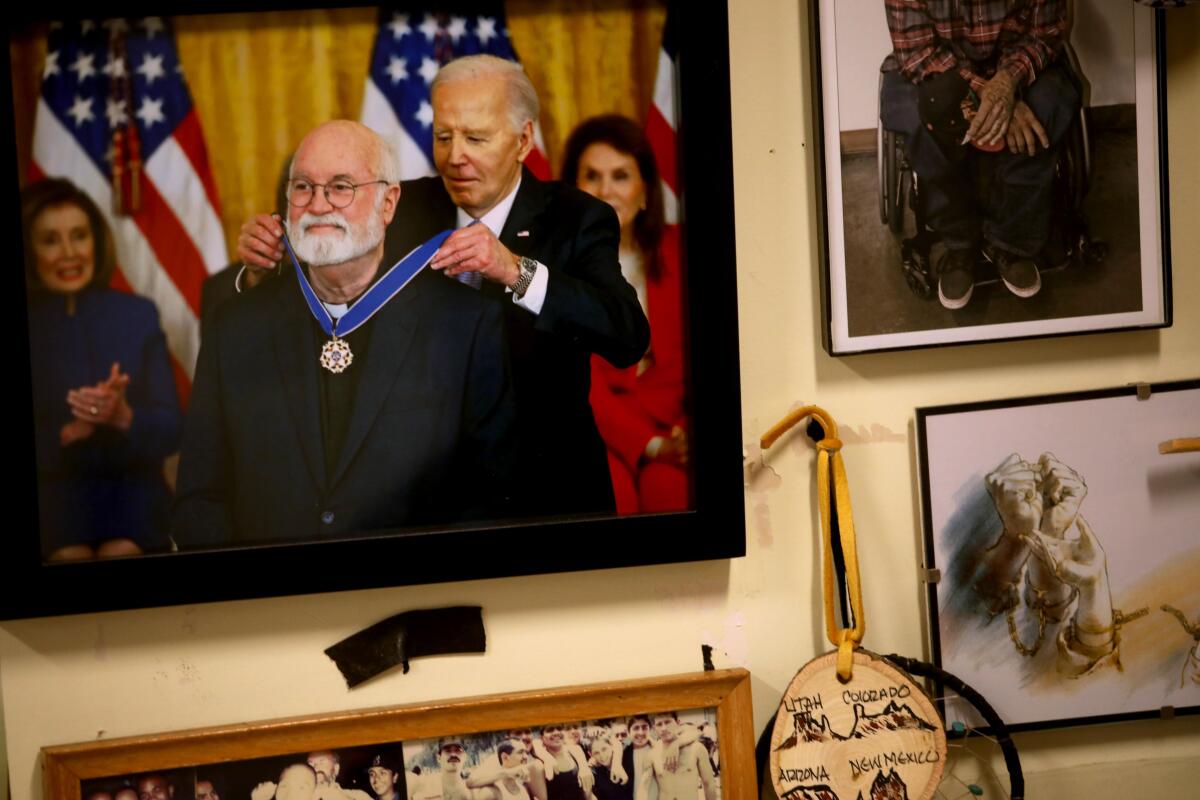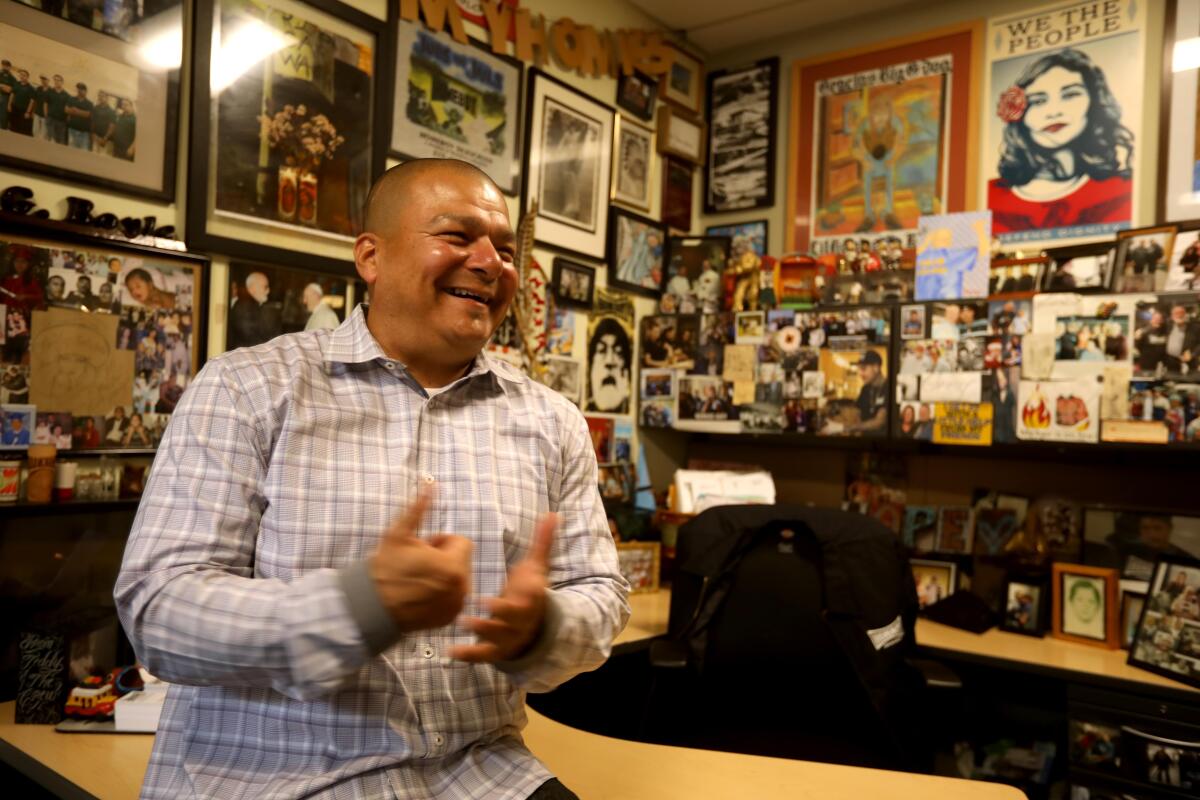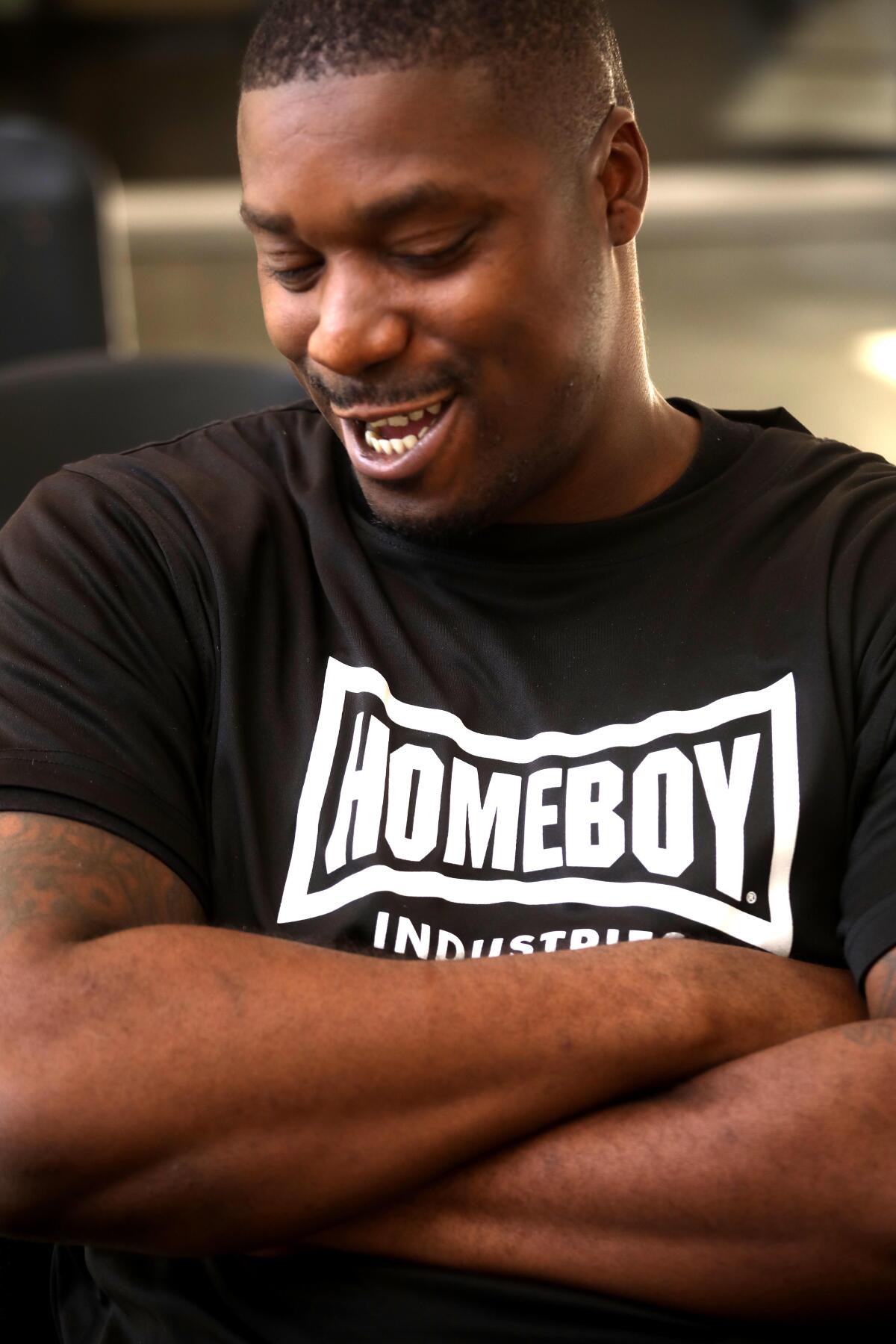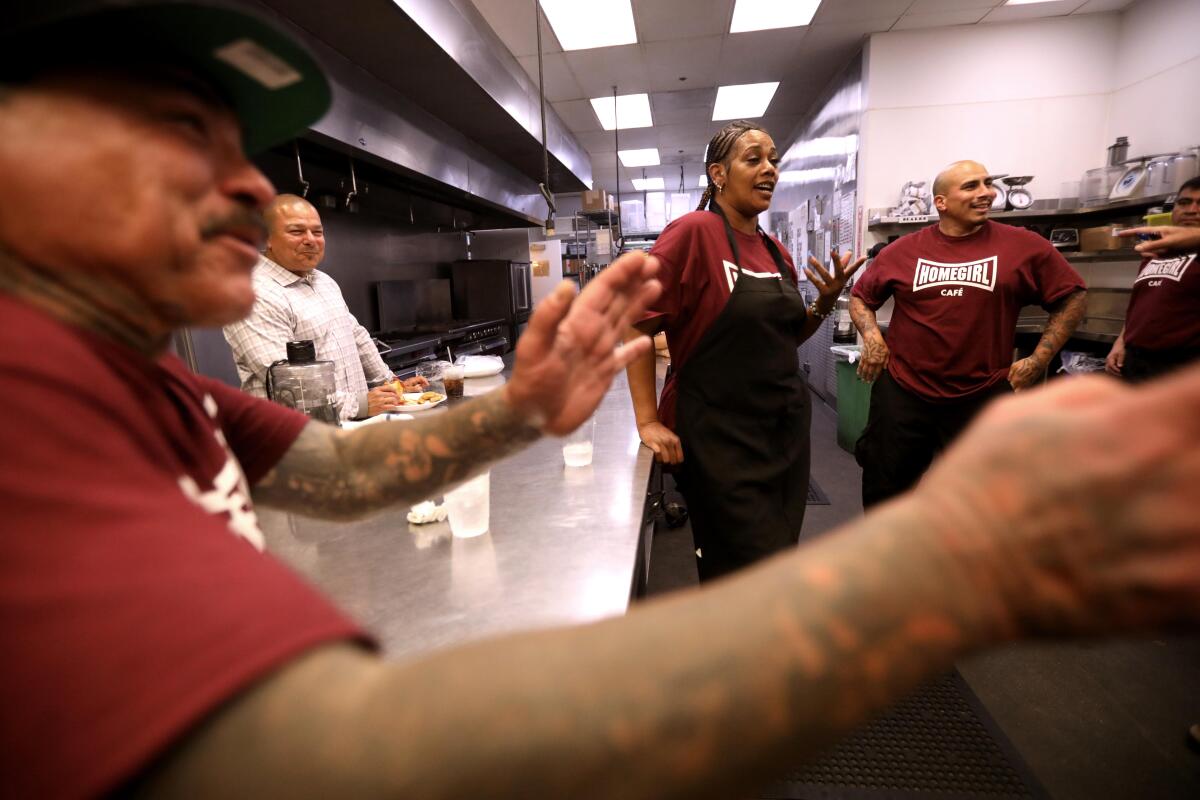-
San Diego sheriff: Migrants did not try to forcefully stop school bus - August 31, 2024
-
One stabbed, another injured in altercation on L.A. Metro bus - August 31, 2024
-
Trump Judge Has ‘Two Options’ as Future of Case Unclear: Analyst - August 31, 2024
-
What to Know About Putin’s Planned Visit to Mongolia Amid ICC Arrest Warrant - August 31, 2024
-
Buying sex from a minor could be a felony under bill headed to Newsom - August 31, 2024
-
Democrat Lawmaker Switches Party to Become Republican - August 31, 2024
-
Misdated Mail-In Ballots Should Still Count, Pennsylvania Court Rules - August 31, 2024
-
Cause and manner of death determined for Lucy-Bleu Knight - August 31, 2024
-
NASCAR Craftsman Truck Series Announces Return To Iconic Circuit In 2025 - August 31, 2024
-
At Pennsylvania Rally, Trump Tries to Explain Arlington Cemetery Clash - August 31, 2024
Column: At Homeboy, the scoop on Father Greg and his latest honor
When Father Greg Boyle of Homeboy Industries was awarded the Presidential Medal of Freedom by President Biden on May 3, I thought about dropping by to talk to him, but then I hesitated.
He’s not one to take bows, and I knew he’d credit everyone but himself. So it would be tough to come up with a new angle, even with the city of Los Angeles now proclaiming that May 19 will be Father Greg Boyle day in honor of the man who started the world’s largest gang intervention and rehabilitation program.
But then I got an idea. What if I talked to former gang members and inmates rather than to the patron saint of second chances, who turns 70 on Sunday? They know him better than anyone, and maybe I’d find out things I didn’t know.

A photograph of Father Greg Boyle receiving the Presidential Medal of Freedom from President Joe Biden has been added to the walls of his office at Homeboy Industries in Los Angeles.
(Genaro Molina/Los Angeles Times)
My timing was perfect, because Boyle was out of the country.
“Go for it,” he said in an email from Ireland.
I dropped by Homeboy on Tuesday and spent a few minutes with Pamela Herrera, 39, who arrived in 2011 after her release from prison.
“When I walked into his office, he asked me, ‘Hey, kiddo. What are you here for?’” Herrera said. “I told him I wanted to change my life.”
And she did. Herrera is general manager of Homegirl Cafe, and although she had never heard of the Presidential Medal of Freedom, she said Boyle is a worthy recipient. I asked if she’d seen him wearing the medal, because I know that if I had won one of those, I’d wear it everywhere.
“He needs to do that,” she agreed, but no, she hadn’t seen the medal.

Hector Verdugo, associate executive director for Homeboy Industries, smiles as he shares stories about Father Greg Boyle.
(Genaro Molina/Los Angeles Times)
Hector Verdugo, 49, didn’t know what had come of the medal, either. The former gang member, who arrived 18 years ago and now helps run Homeboy as associate executive director, knew what he would do if he were to win the hardware.
“I would wear it,” he said. “I would cruise down Whittier Boulevard on my motorcycle.”
I can’t begin to tell you how much I love that visual, but unfortunately, that’s not Boyle’s style. In fact, Verdugo said, the padre is in the habit of giving away things that are gifted to him.
“The only time you’ll see him keep a gift is if it’s a bottle of whiskey,” Verdugo said.
Now we’re getting somewhere. Boyle likes single malt Scotch, and Verdugo has observed a tradition in which clergy imbibe at an evening “social.”
I knew I liked the Jesuits.
I asked Verdugo and others if Boyle, behind the scenes, is a tough boss. Nobody had any beans to spill, but Verdugo said there is one rite of passage at Homeboy in which Boyle is inflexible.
“He takes you to a steak dinner,” Verdugo said, “and then he says, ‘How would you like your steak, son?’ Or the waiter will ask. And homies are, ‘Well done?’ He’ll say, ‘Order a hamburger. You’re not going to have a steak that’s well done. That just ruins it.’”

“In reality, he deserved every bit of that award,” said Jarvis Thompson about Father Greg Boyle receiving the Presidential Medal of Freedom at Homeboy Industries in Los Angeles.
(Genaro Molina/Los Angeles Times)
Who would have thought that a man so generous and accommodating — so famously nonjudgmental — could be so particular when it comes to how you order your steak?
I tested Verdugo’s account with Jarvis Thompson, 30, who told me he traveled to Texas with Boyle to make a speech about his transformation at Homeboy, where he works in community relations.
Texas is a cattle state, I said. Did you go out for a steak, and if so, did Father Boyle offer any advice?
“I wanted it well done,” Thompson said.
And what did Boyle tell him?
“You’re going to mess the steak up,” Thompson said.
Stefanie Rios, 39, assistant cafe manager, had one more tidbit of interest.
“I mean, he kind of cusses sometimes,” Rios said.
I hope he’s coming clean in confession.
To be honest, though, all anyone wanted to talk about was a man who created a place that feels like home.
Thompson calls Boyle “Pops,” as do many others, including Verdugo, 49. I sat with him in Boyle’s office, where there’s a photo of President Biden putting the medal around Boyle’s neck.
“This one’s special. Our nation’s leader is honoring our Pops, our father, and I don’t say father in a priestly way,” Verdugo said. “I say father like he’s our father. And I’m honored that that’s my Pops right there. He calls me. I call him. He calls me his son, you know what I mean? And now he’s getting accolades from one of the most powerful people in the world. As it should be.”
Homeboy hasn’t worked for everyone over the years. Some have fallen away, some can’t surmount the damage they’ve absorbed or inflicted on others, and too many have died young.
But it’s worked for thousands, largely because Boyle understands the deep layers of their troubles and the countless roadblocks to recovery.
“He always told me to never stop coming back,” said Rios, who was in and out of lockup for years. “He said, ‘I don’t care how many times it takes you. I don’t care if you mess up. My doors will always be open to you, and never give up.’”

Noel Rubio, from left, Hector Verdugo, associate executive director for Homeboy Industries, Taloma Miller and Steve Montoya share their stories about Father Greg Boyle at Homeboy Industries.. “He’s blessed me so much,” said Miller about Father Greg.
(Genaro Molina/Los Angeles Times)
Noel Rubio, 62, a kitchen worker at Homeboy, said he sold drugs as a youngster and used to see Boyle riding through the neighborhood on his bicycle.
“I wanted to steal his bike because I wanted a beach cruiser,” Rubio said. “He said, ‘You need to quit selling drugs and come work with us.’”
Rubio ignored Boyle and spent half his life in prison.
“Thank God he was able to find me,” Rubio said. “Since I’ve been here he taught me how to love people, how to respect people.”
Father Boyle had a radical idea, said kitchen worker Manuel Ornelas, 50, who heard about Homeboy while in prison. I asked what that idea was.
“That we deserve a second chance. That he believed in us when nobody else did,” Ornelas said. “If you know his history, he went into the middle of shootouts. … He was willing to put his life on the line to get through to us.”
Line cook Taloma Miller, 51, said she spiraled into addiction and incarceration after her 14-year-old son, basketball prodigy Semaj, was murdered in 2020. One day she saw Boyle in a TV news clip and he looked like Santa Claus to her.
“I was like, ‘He has a beautiful spirit. I wanna be there,’” Miller said. “When I walked through the doors and I saw him, he was just smiling. … He hugs me, he tells me, ‘I love you.’ He prays for me. … I ask him, ‘Am I in the right place?’ He says, ‘You’re here, right? How do you feel?’ I feel so good being here, because there’s nothing like home.”
Verdugo said he’s been awed by Boyle’s patience and generosity but used to wonder if the new arrivals needed a firmer hand.
“I would say, you have more patience than I do. … They’re taking advantage of you,” said Verdugo. “And he’d say, ‘No, son. I’m giving them the advantage.”
A few years ago, I asked Boyle if he ever considered retirement. He told me Jesuits retire in the graveyard, and that seems to be what his Homeboy family expects.
“I think that man has a purpose on this earth,” said Steve Montoya, 36, who doesn’t see Boyle hanging it up.
“To be honest, I think he’s going to do this until the end,” said Thompson.
“When he’s in heaven, he’s going to be doing this,” said Miller. “He’s going to be sending his special workers, his special elves and his little angels to take care of this foundation. This is a foundation that will never be shaken.”
True to form, Boyle’s official reaction to being one of 19 people to receive the nation’s highest civilian honor in May was to say the recognition “honors many thousands of men and women who have walked through our doors … since 1988.” He added that it “acknowledges their dignity and nobility and the courage of their tenderness” and marks the need to “invest in people and to create together a community of cherished belonging.”
A Scotch and a steak to that.
Medium rare, of course.
steve.lopez@latimes.com
Source link













